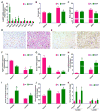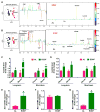Intermittent Fasting Promotes White Adipose Browning and Decreases Obesity by Shaping the Gut Microbiota
- PMID: 28918936
- PMCID: PMC5668683
- DOI: 10.1016/j.cmet.2017.08.019
Intermittent Fasting Promotes White Adipose Browning and Decreases Obesity by Shaping the Gut Microbiota
Erratum in
-
Intermittent Fasting Promotes White Adipose Browning and Decreases Obesity by Shaping the Gut Microbiota.Cell Metab. 2017 Nov 7;26(5):801. doi: 10.1016/j.cmet.2017.10.007. Cell Metab. 2017. PMID: 29117546 Free PMC article. No abstract available.
Abstract
While activation of beige thermogenesis is a promising approach for treatment of obesity-associated diseases, there are currently no known pharmacological means of inducing beiging in humans. Intermittent fasting is an effective and natural strategy for weight control, but the mechanism for its efficacy is poorly understood. Here, we show that an every-other-day fasting (EODF) regimen selectively stimulates beige fat development within white adipose tissue and dramatically ameliorates obesity, insulin resistance, and hepatic steatosis. EODF treatment results in a shift in the gut microbiota composition leading to elevation of the fermentation products acetate and lactate and to the selective upregulation of monocarboxylate transporter 1 expression in beige cells. Microbiota-depleted mice are resistance to EODF-induced beiging, while transplantation of the microbiota from EODF-treated mice to microbiota-depleted mice activates beiging and improves metabolic homeostasis. These findings provide a new gut-microbiota-driven mechanism for activating adipose tissue browning and treating metabolic diseases.
Keywords: beige adipocytes; browning; every-other-day fasting (EODF); gut microbiota; intermittent fasting; metabolic syndrome; obesity; short-chain fatty acid.
Published by Elsevier Inc.
Figures







Comment in
-
Obesity: Fasting every other day promotes beiging of white adipose tissue.Nat Rev Endocrinol. 2017 Nov;13(11):623. doi: 10.1038/nrendo.2017.131. Epub 2017 Sep 29. Nat Rev Endocrinol. 2017. PMID: 28960211 No abstract available.
References
MeSH terms
Substances
Grants and funding
LinkOut - more resources
Full Text Sources
Other Literature Sources
Medical
Molecular Biology Databases

